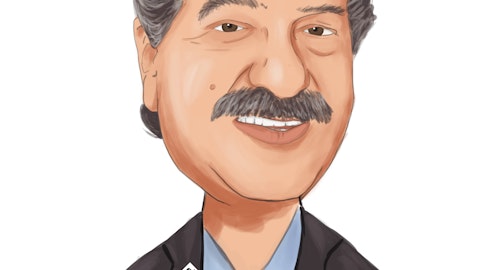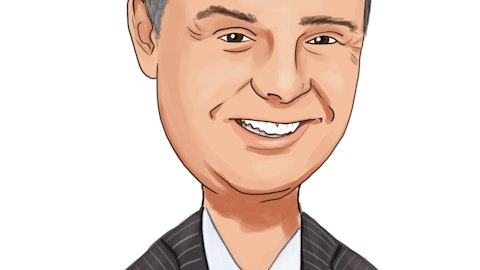Scott Kingsley: So, most of that is indicative of that. In terms of FICO band for indirect auto, an average FICO above 750. And to your point, the Manheim Index is still very, very high, very buoyant from historical standards. I think the silver lining to that is we made loans during the last couple of years in indirect auto that were lower than historical yield, which meant that the customer is very quickly working through their pay down of their instruments. So, I think from a loan to value standpoint, we’re not concerned where we are today. There is still a little bit of a backlog relative to vehicle inventory. And especially in our markets that don’t enjoy a lot of public transportation — everybody drives the work. So, from a commentary standpoint, I’d say not concerned about that portfolio and still being able to manage the customer outcomes.
Historically, in that employment characteristics or unemployment characteristics and the performance of that portfolio have been (ph). So, from a productive standpoint, we think that portfolio will still be something that’s meaningfully additive to our net mix all year long.
Matthew Breese: Got it. Okay. Thank you. Last one for me. Scott, you had mentioned that you expect a slight migration higher on overall expenses in 2023. I was hoping you could just be a bit more specific there. Are we looking at low single digits or mid single digit expense growth this year versus next? Yes, dealer side?
Scott Kingsley: Yes. If I framed it this way, I would tell you that the midpoint between our third quarter operating expenses and our fourth quarter operating expenses is probably a really good baseline before we start to talk about merit increases. We expect sort of a late first quarter merit change for our folks in the neighborhood of 4% to 5%. And what we think about that is the combination of merit changes and some compression needs that we have with the — with people being hired in more recent times at rates, maybe a little higher than some of their peers. We do have some compression to deal with. I think that’s across the board for most enterprises. So, we suspect instead of sort of the historical standard of 3% type of inflationary increases, we’re a little bit above that going forward.
As it relates to the rest of our nonoperating base, maybe expect a little bit more utilization of some technology tools on a fully incurred basis next year that push that up a little bit. But other than that, we’re not seeing signs that anything else is really being meaningfully impacted by inflationary price change in our operating base.
Matthew Breese: Perfect. I appreciate it. That’s all I had. Thanks for taking my questions.
Scott Kingsley: Matt, let me give you one more. Someone just reminded me. Our friends at the FDIC are trying to collect a little bit more on a per deposit dollar assessment basis next year. We think that probably cost us $0.04 a share next year in terms of that higher base. And I think this goes without saying, but as a reminder, in the first half of the year, we still have a negative comparison because of the Durbin impact, because, obviously, that started for us in July. So, $8 million less in debit interchange revenues in the first half of the year is our expectation compared to 2021.
Matthew Breese: Got it. Okay. Do you have that — you said $0.04. What is that on a dollar amount or relative to deposits in terms of basis points?
Scott Kingsley: Yes. So, it’s $2.2 million of expected expense. And in my head, that must mean it is 2 basis points or 3 basis points.
Matthew Breese: Got it. Okay. Thank you, Scott. Thank you, John. I appreciate taking my questions.
Scott Kingsley: Thank you, Matt.
John H. Watt, Jr.: Thanks, Matt.
Operator: Thank you. I am now not showing any further questions. I will now turn the call back to John Watt for his closing remarks.
John H. Watt, Jr.: Thank you, Chris, and thank you all for participating in our fourth quarter and year end 2022 call. Look forward to catching up with you at the end of the first quarter. Have a great day. Thanks.
Operator: Thank you, Mr. Watt. This concludes our program. You may now disconnect and have a great day.
Follow Nbt Bancorp Inc (NASDAQ:NBTB)
Follow Nbt Bancorp Inc (NASDAQ:NBTB)
Receive real-time insider trading and news alerts





